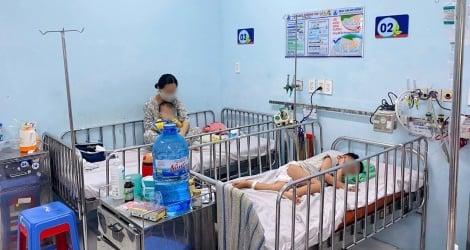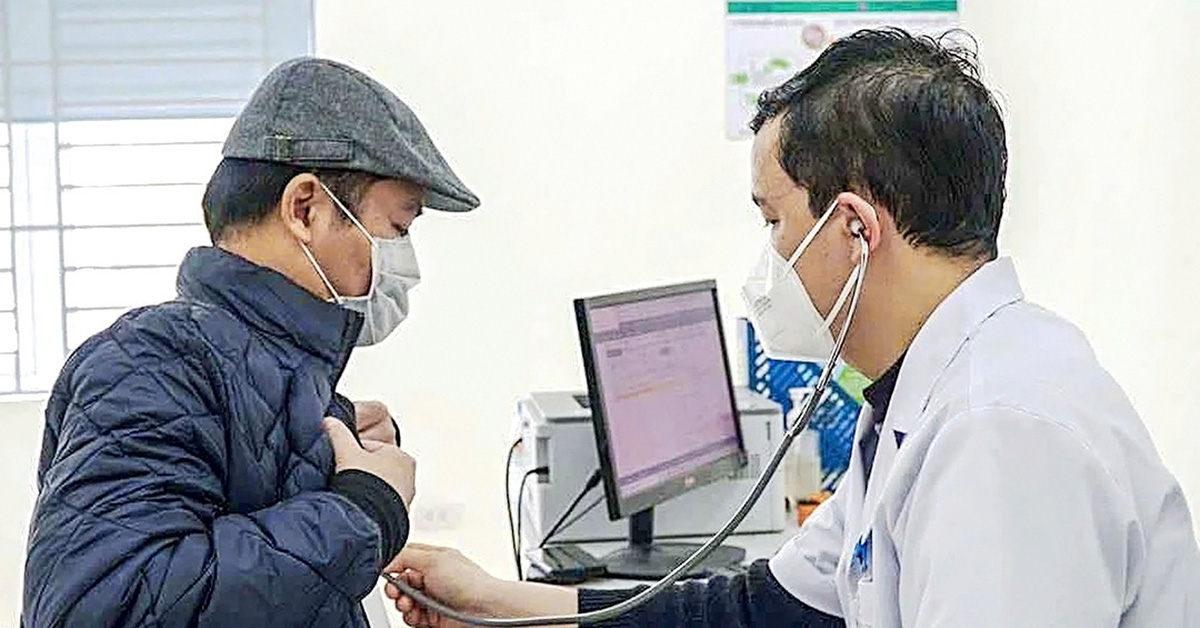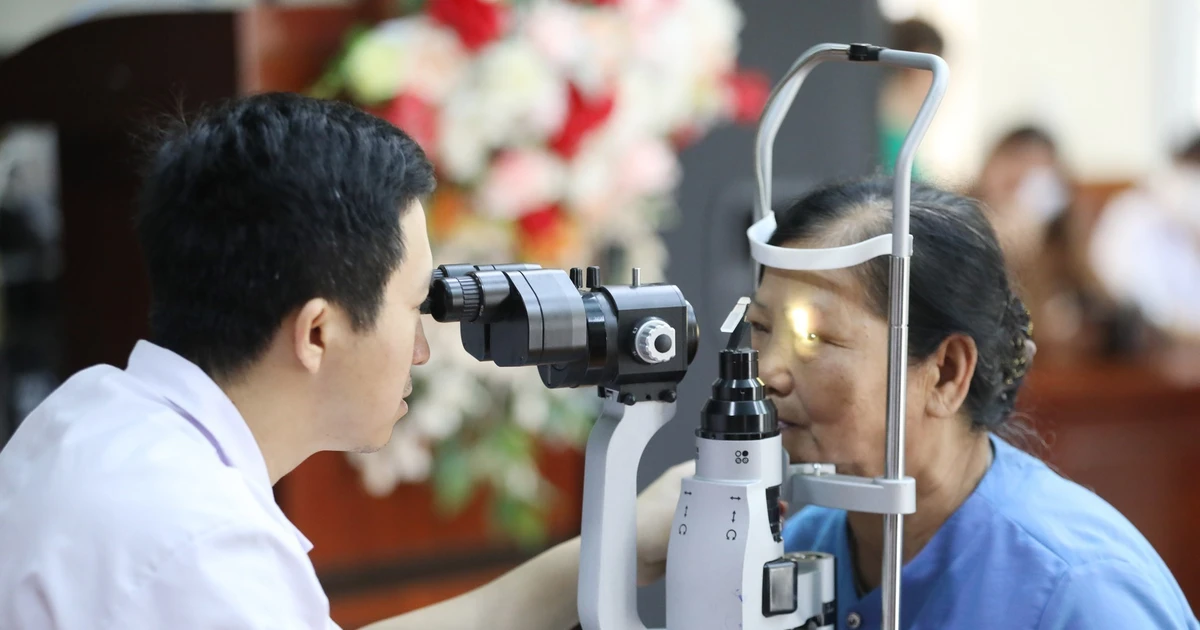End-line hospitals have recorded many cases of dengue fever being treated at home or going to the hospital late, leading to unfortunate consequences.
 |
| Patients being treated for dengue fever at the Central Hospital for Tropical Diseases. (Photo: Hoang Le) |
It is a mistake to think that once the fever is gone, the disease is gone when you have dengue fever.
The country has now recorded more than 93,800 cases of dengue fever, with 26 deaths. In Hanoi, the number of dengue fever cases continues to increase, with the entire city recording over 15,300 cases.
According to specialist doctor II (BSCK II) Nguyen Trung Cap - Deputy Director of the Central Hospital for Tropical Diseases (TW), dengue fever is divided into different stages (phases), specifically:
Phase 1: The patient has high fever, headache, and discomfort lasting about 3 days. This phase makes the patient very uncomfortable due to high fever, headache, and vomiting, but rarely causes serious complications, only fever reduction and oral rehydration solution.
Phase 2: From the end of day 3 - the end of day 7.
Patients have 2 conditions, in the group of patients with good progress (94% of people) will gradually recover. The remaining 6% of patients, the risk of severe progress, blood in the blood vessels is concentrated. If severe, it can lead to hypotension, shock.
“When having dengue fever, depending on the phase of the disease, different tests are needed. In the early phase, in the first 3 days, a positive test is important, but if the test is only done on the 4th day, it may be negative. Therefore, in some patients, even though they have dengue fever clinically, the test may be negative, and it is still considered dengue fever. The test the next day may be positive. When receiving a test result, it is necessary to clearly understand which phase of the disease was performed to know the value of the test,” said the Deputy Director of the National Hospital for Tropical Diseases.
At the end-line hospitals, many cases of dengue fever patients in critical condition, including young people, have been recorded. Many cases, due to home treatment or subjectively coming to the hospital late, have had unfortunate consequences.
At the Tropical Disease Center, Bach Mai Hospital, 6 deaths due to dengue fever were recorded, most of them due to late arrival at the hospital with symptoms of hypovolemic shock, blood clotting disorders and multiple organ failure.
At the Central Hospital for Tropical Diseases, there have been many unfortunate mistakes in which, after the initial stages of the disease, patients and caregivers often subjectively think that the disease has been cured when the fever subsides. Dr. Nguyen Trung Cap shared the case of a female student studying in Hanoi who had symptoms of high fever in the first days of dengue fever.
During this period, the patient rested at home, was cared for and closely monitored by his roommate. On the 5th day, the patient's fever subsided. Thinking that the illness was almost over, the roommate let the patient rest alone at home to go to school.
However, in a short time, the female student's condition suddenly worsened. When her roommate discovered her, she was in shock due to blood loss and plasma leakage. The patient was taken to the hospital but it was too late and she died shortly after.
There is a similar case of an elderly person, when the fever is high in phase 1, the children stay home to take care of the person, when the fever is better in phase 2, the children go to work, leaving the old man at home alone, by the time he returns at the end of the day, the old man's condition has worsened.
Signs of dengue fever that can progress to severe
According to experts, the most worrying thing in dengue fever patients is shock, which often occurs in phase 2 and is difficult to monitor. If the patient receives good intervention right from the warning signs, before shock, they will recover quickly. If it is not detected and progresses to shock, the situation will be extremely bad, and the survival rate will not be high.
BSCKII Nguyen Trung Cap also pointed out warning signs of severe dengue fever that people need to pay special attention to:
The patient is tired. Children and the elderly in particular may become lethargic, lethargic, and slow. Children who used to cry a lot now become weak.
- Some patients have pain in the liver area.
- Some patients have pain throughout the abdomen.
- Some patients vomit and feel nauseous (Vomiting 3 times/8 hours is considered severe vomiting)
- Bleeding gums, hemorrhage…
“These are warning signs that the disease is at risk of becoming serious. Tests show a decrease in platelets, blood concentration, increased liver enzymes... When these warning signs are detected, you must go to a medical facility immediately for timely treatment. Because the treatment time for the patient to recover is not much, only a few hours. If this stage is missed by 4-6 hours, the patient may fall into hypotension, shock, uncontrolled bleeding, and the risk of multiple organ failure...”, said Dr. Nguyen Trung Cap.
| People at high risk of severe progression of dengue fever: - Group under 4 years old, especially under 12 months old. - Group of underlying diseases, easy to bleed, have idiopathic thrombocytopenic purpura, have blood clotting disease, difficult to stop bleeding. Unfortunately, when dengue fever, thrombocytopenia causes bleeding, stopping bleeding is very complicated. - Obese people react very strongly to dengue fever, the rate of severe illness in this group is higher. When severe illness occurs, treatment is much more difficult. - Pregnant women with dengue fever can give birth at any time. If platelets decrease, the risk of bleeding during delivery is very high. - Some other groups, people with blood type O may be heavier than people with other blood types...but these are only minor factors. |
Source


![[Photo] Prime Minister Pham Minh Chinh chairs conference to review the implementation of Resolution No. 18-NQ/TW](https://vstatic.vietnam.vn/vietnam/resource/IMAGE/2025/4/14/dcdb99e706e9448fb3fe81fec9cde410)


![[Photo] National Assembly Chairman Tran Thanh Man meets with General Secretary and President of China Xi Jinping](https://vstatic.vietnam.vn/vietnam/resource/IMAGE/2025/4/14/4e8fab54da744230b54598eff0070485)
![[Photo] Ceremony to welcome General Secretary and President of China Xi Jinping on State visit to Vietnam](https://vstatic.vietnam.vn/vietnam/resource/IMAGE/2025/4/14/5318f8c5aa8540d28a5a65b0a1f70959)
![[Photo] General Secretary To Lam holds talks with General Secretary and President of China Xi Jinping](https://vstatic.vietnam.vn/vietnam/resource/IMAGE/2025/4/14/b3d07714dc6b4831833b48e0385d75c1)
























































































Comment (0)